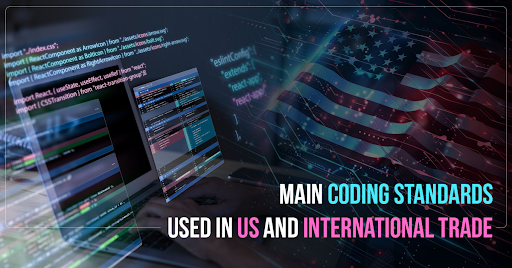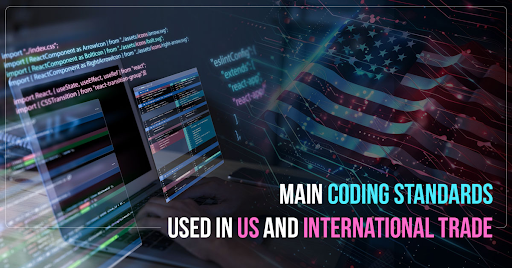
In trade and commerce, coding standards are essential for identifying, classifying, and tracking goods and services across borders. These codes ensure consistency, accuracy, and compliance with regulations in customs, tariffs, logistics, and supply chain management.
1. Harmonized System (HS) Codes
Purpose:
International classification of traded products.
Issued by:
World Customs Organization (WCO).
Format:
- 6-digit universal code used by 200+ countries.
- Some countries extend it with additional digits.
Example:
HS Code for men’s cotton shirts: 6205.20
- First 2 digits → Chapter: 62 (Apparel)
- Next 2 digits → Heading: 05 (Shirts)
- Last 2 digits → Subheading: 20 (Cotton)
Usage:
- Applied globally for customs declarations and tariff calculations.
- Used in free trade agreements and import/export documentation.
2. Schedule B Codes (US Export Codes)
Purpose:
US-specific export classification system.
Issued by:
US Census Bureau.
Format:
- 10-digit code based on the HS Code.
Example:
HS Code: 6205.20 → Schedule B: 6205.20.0000
Usage:
- Required for US export documentation.
- Used for reporting export statistics.
3. Harmonized Tariff Schedule (HTS or HTSUS) (US Import Codes)
Purpose:
US-specific import classification system.
Issued by:
US International Trade Commission (USITC).
Format:
- 10-digit code, based on the HS Code.
Example:
HS Code: 6205.20 → HTS Code: 6205.20.1000
Usage:
- Used in US import declarations.
- Determines customs duties.
4. UN/CEFACT Codes (United Nations Centre for Trade Facilitation and Electronic Business)
Purpose:
Standardizes electronic data interchange (EDI) for trade.
Includes:
- UN/LOCODE: Location codes for ports, airports, and locations.
- UNSPSC (United Nations Standard Products and Services Code): Classification of products and services.
Example:
- UN/LOCODE: USLAX → Los Angeles, USA.
- UNSPSC Code: 43211505 → Desktop computers.
Usage:
- Used in logistics, procurement, and customs.
- Supports electronic trade documentation.
5. ISO Country, Currency, and Language Codes
Purpose:
International standard codes for country, currency, and language identification.
Issued by:
International Organization for Standardization (ISO).
Key codes:
- ISO 3166: Country codes (e.g., US → United States, IN → India).
- ISO 4217: Currency codes (e.g., USD → US Dollar, EUR → Euro).
- ISO 639: Language codes (e.g., en → English, fr → French).
Usage:
- Applied in trade documentation, financial transactions, and data management.
6. Global Trade Item Number (GTIN) & Global Location Number (GLN)
Purpose:
Standardized product and location identification.
Issued by:
GS1 (Global Standards Organization).
Includes:
- GTIN-12: 12-digit US UPC (Universal Product Code).
- GTIN-13: 13-digit EAN (European Article Number).
- GLN: 13-digit location identifier.
Usage:
- Used in retail, logistics, and supply chain management.
- Essential for product labeling and barcodes.
7. Export Control Classification Number (ECCN)
Purpose:
US classification for dual-use items (civilian + military).
Issued by:
US Department of Commerce.
Format:
- 5-character alphanumeric code.
Example:
3A001 → Electronic devices with encryption.
Usage:
- Required for export compliance.
- Determines if an item needs an export license.
8. Standard Carrier Alpha Code (SCAC)
Purpose:
Carrier identification in logistics and transportation.
Issued by:
National Motor Freight Traffic Association (NMFTA).
Format:
- 2 to 4-letter code.
Example:
UPSZ → UPS Ground.
Usage:
- Used in freight documentation and customs clearance.
Key Takeaways
- HS Codes: Global standard for product classification.
- Schedule B & HTSUS: US-specific export and import codes.
- ISO & UN/CEFACT Codes: Standardize country, currency, and trade locations.
- GTIN & SCAC: Essential for logistics and product identification.
- ECCN: Required for US export compliance.
Sunstream master data services team can provide different types of export and trade-related coding services. If you are looking for assistance in trade-related coding, reach out to Sunstream for support. Sunstream also provides product environmental compliance services, including RoHS, REACH, Prop65, PFAS, CEPA, and several other regulations that affect your products’ international market.





 +1.585.935.7123
+1.585.935.7123 +91-804-148-6861
+91-804-148-6861